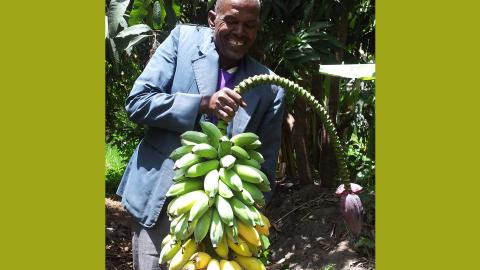
Farming novice now a success story
Fifty-five year old Desta Beletew beams with happiness. Nine years ago his family only planted teff, an Ethiopian food plant from which the popular bread called injera is made. He defied traditional practices and embraced World Vision’s clarion call to farmers to embrace new agricultural practices.
Today, Desta, who is happily married with eight grown up children, considers his new status a miracle. Before his interaction with World Vision, he absolutely had no agricultural knowledge. He says that like his forefathers, he routinely planted teff, waited for rains, weeded and harvested. But the tide has dramatically changed.
Desta's profits have increased from 100 birr to 80,000 birr for one year.
“World Vision brought an expert to this area. He trained me and others and then went on to distribute fruit, food and tree seedlings,” he recalls.
He enumerates the seedlings he received as mango, tomato, paw paw and avocado. It did not stop there as he was shown how to graft the few mango trees that he had.
Desta who has bountiful harvests is a happy man. He reveals that he earns over 50,000 birr per year from onions and over 30,000 birr from fruits and other products.
“Can you imagine that before I made this transformation in agriculture with the support of World Vision, I only made less than 100 birr every year in profits!” he smiles as he drives his point home.
He says it is hard to even imagine that his family relied on the same teff for food, year in year out. But is now grateful to God for the great variety as his disposal that is good for health.
The positive changes to his family are not limited to the variety of food only, he has built a modern family house that cost him 200,000 birr.
He is also proud that while he has a large family, he was has been able to send all his children to relatively good schools.
“All my children are living comfortable lives. Even those who are job searching [went] to school,” he says.
Desta, who witnessed the 1984 famine, still shudders when he remembers the suffering they went through.
Knowledge provided by World Vision means that famines can be relegated to the past.
“I attribute what happened to lack of rains and knowledge of agricultural practices that I now know, “ he says.
He says that although they had underground water then, locals did not know anything about irrigation methods and rain water harvesting that they now know, courtesy of World Vision.
“I have a personal generator that helps me pump water, in addition to water harvesting skills that I have learnt and use," he proudly says.
Desta has also gone philanthropic, because of what he received from World Vision. He says he also freely shares his knowledge with any farmer within Antsokia, but also distributes seedlings freely to others.
"My advice to everybody is for them to share whatever one has. It is this sharing that changes the world,” he concludes.